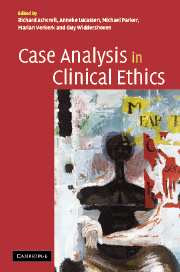Book contents
- Frontmatter
- Contents
- Notes on contributors
- Acknowledgements
- 1 Philosophical introduction: case analysis in clinical ethics
- 2 Families and genetic testing: the case of Jane and Phyllis
- 3 Family access to shared genetic information: an analysis of the narrative
- 4 A virtue-ethics approach
- 5 Interpretation and dialogue in hermeneutic ethics
- 6 ‘Power, corruption and lies’: ethics and power
- 7 Reading the genes
- 8 A utilitarian approach
- 9 A feminist care-ethics approach to genetics
- 10 A conversational approach to the ethics of genetic testing
- 11 Families and genetic testing: the case of Jane and Phyllis from a four-principles perspective
- 12 A phenomenological approach to bioethics
- 13 An empirical approach
- 14 Response to ethical dissections of the case
- 15 Philosophical reflections
- Index
- References
9 - A feminist care-ethics approach to genetics
Published online by Cambridge University Press: 01 September 2009
- Frontmatter
- Contents
- Notes on contributors
- Acknowledgements
- 1 Philosophical introduction: case analysis in clinical ethics
- 2 Families and genetic testing: the case of Jane and Phyllis
- 3 Family access to shared genetic information: an analysis of the narrative
- 4 A virtue-ethics approach
- 5 Interpretation and dialogue in hermeneutic ethics
- 6 ‘Power, corruption and lies’: ethics and power
- 7 Reading the genes
- 8 A utilitarian approach
- 9 A feminist care-ethics approach to genetics
- 10 A conversational approach to the ethics of genetic testing
- 11 Families and genetic testing: the case of Jane and Phyllis from a four-principles perspective
- 12 A phenomenological approach to bioethics
- 13 An empirical approach
- 14 Response to ethical dissections of the case
- 15 Philosophical reflections
- Index
- References
Summary
Feminist care-ethics makes a difference when analysing and discussing healthcare issues. As a specific moral perspective it frames moral questions in healthcare in terms of responsibilities and is concerned more about the dangers of abandonment than the dangers of interference. The care perspective also invites us to re-examine and re-evaluate current conceptions of autonomy and moral relationships. In this chapter I shall try to show that care-ethics, as a relational ethics, makes a difference in the moral reading of problems arising in the use of genetics. In arguing this, I will start by presenting the main characteristics of care-ethics. I will then go on to discuss the issue of whether care-ethics can be seen as a feminist ethical perspective. In the final part of the chapter I will show how care ethics can make a difference to the discussion of ethical issues in genetics. In particular, I shall concentrate on the tension between responsibility toward others and the value of personal autonomy.
Care ethics
In 1982, Carol Gilligan published In a Different Voice, in which she put forward the thesis that a so-called ethics of justice gives only a partial voice to the moral experiences of men and especially of women. An ethics of justice, needs to be complemented by an ethics of care that is capable of articulating the moral values of nurturing and caring. In developing this care perspective Gilligan challenged the idea that abstract and universalistic moral reasoning was the best way of thinking about moral problems.
- Type
- Chapter
- Information
- Case Analysis in Clinical Ethics , pp. 133 - 148Publisher: Cambridge University PressPrint publication year: 2005
References
- 4
- Cited by



